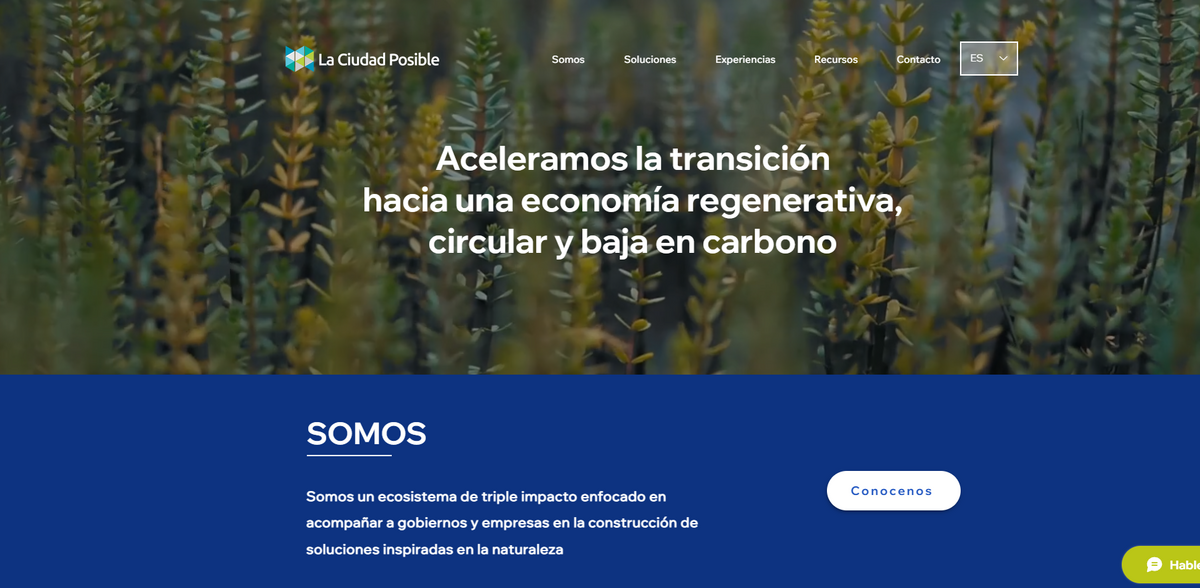What is the Project?
The project regenerates resources to sustain life in cities and territories of the future. It accompanies governments, companies, and communities in building sustainable solutions to accelerate the transition towards a circular, regenerative, and low‐carbon economy. With a focus on facilitating processes, supporting socio‐environmental impact projects, and offering technical advice and consulting services, the project delivers a comprehensive approach to addressing the challenges of resource, ecosystem, and climate crises. It builds capacities through education, trains people, companies, and organizations in the development of strategic knowledge for an ecosystemic transition, and promotes initiatives that regenerate territories. The project is dynamic, tapping into experiences that accelerate entrepreneurship, connecting circularity with innovative solutions, and nurturing collaboration to transform the future… all while remaining committed to sustainability at every local level.
Main Benefit: Key Figures and Facts
Highlights include:
- Emprende + Regenerativo program: Supported by Corfo Los Lagos, executed in Chiloé by La Ciudad Posible, 2811, and Bosque Frío.
- More than 30 entrepreneurs from Chiloé participated in training on regenerative and sustainable practices.
- Development of studies, technical advice, and consulting services for both public and private organizations.
- Innovative solutions such as the ReLata initiative, which connects base managers, recyclers, and local communities for effective waste management in Chile.
- Technical visits that have enhanced traditional practices, like the collaboration with Isla Bonita to learn about the process of manufacturing recycled plastic fiber for artisanal fabrics.
Education and Capacity Building
The project builds capacities by training people and organizations in acquiring strategic knowledge essential for the ecosystemic transition. Education plays a crucial role, enabling individuals, companies, and communities to grasp regenerative and sustainable practices. Training initiatives are designed to empower participants with the skills needed to accelerate positive change. By combining learning with hands-on experiences, the project fosters an environment where knowledge is shared and applied to create lasting impact… bridging the gap between scientific and technological systems and local realities.
Community Engagement and Conservation
Community engagement is at the heart of this initiative, with a clear commitment to promoting sustainability, ecosystem regeneration, and local development. Efforts include managing public campaigns focused on ecosystem restoration and supporting local initiatives that yield global impact. Conservation efforts are vibrant, promoting a regenerative management of water and soil to mitigate water stress and recover ecosystems. The project celebrates the work of local artisans who preserve their territories through sustainable practices, demonstrating that even small-scale actions can contribute to significant environmental change.
Innovation and Collaboration
Innovation is not just about technology—it is about reconnecting with circularity. The project designs and implements creative solutions that promote circularity in diverse sectors. Collaboration plays a key role in transforming the future, with partnerships involving various organizations, companies, and community members committed to regenerating territories. For instance, a technical visit was organized for Isla Bonita to observe how recycled plastic fiber is manufactured, allowing them to incorporate this sustainable material into their artisanal fabric production. Such initiatives reflect an innovative spirit that marries tradition with cutting-edge sustainability practices… sparking dialogue and cultural exchange.
Project Impact: SDGs Linked to the Initiative
- SDG 11: Sustainable Cities and Communities
- SDG 12: Responsible Consumption and Production
- SDG 13: Climate Action
- SDG 15: Life on Land
- SDG 17: Partnerships for the Goals
Looking Forward
The project continues to champion the development of sustainable and regenerative practices, always pushing toward a more resilient and low‐carbon future. It remains dedicated to transforming realities at the local level, nurturing ideas, and fueling initiatives that connect communities with nature and innovation. Upcoming efforts will further integrate cultural connections, conservation, and circular economy practices—all aligned with the goal of accelerating the transition to a circular, regenerative, and sustainable future. With a dynamic approach and collaborative spirit, this initiative stands as a beacon for other communities and organizations seeking to create positive environmental and social change… inspiring hope and action one territory at a time.


















